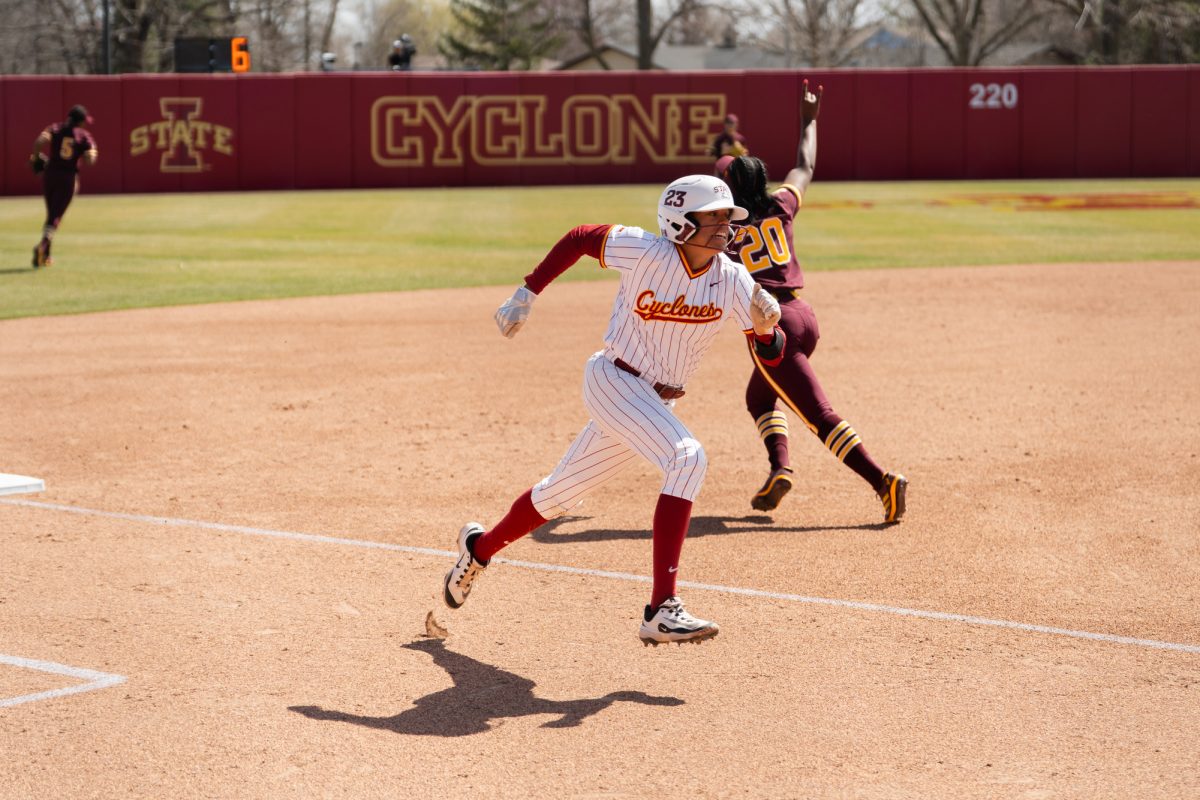Climate change
May 20, 2015
May 20, 2015, President Barack Obama declared climate change to be an immediate risk to national security. There’s no more questioning it; climate change is here to stay.
Climate Change has the potential to completely alter the way that people live today. From devastating crops to potentially increasing crop yields and anything in between, the effects of climate change are not completely certain. However, there is still much that people can do to prepare.
“Capitalism will kill us,” said Maggie LaWare, an English professor at Iowa State.
Capitalism encourages massive amounts of spending and in turn carbon dioxide emissions. LaWare said she believes that the first step to a cleaner environment is cut backs in every aspect of our lives, including a reshaping of our economy. LaWare suggested a sharing economy that would include changes such as; having programs neighborhood sharing programs for items like snow blowers, closer living spaces and more shared transportation systems.
Neighborhood sharing programs would purchase lawn care machinery such as lawnmowers and snow blowers and people in a certain area would share them, LaWare said.
Neighborhood sharing programs would reduce carbon dioxide emissions because instead of everyone in an area using their own machines there would only be one or two running at a given time, LaWare said. Also, closer living spaces would save room for nature, or parks and farms.
Shared transportation is another key element in slowing the effects of climate change because it greatly reduces carbon dioxide emissions by reducing the numbers of cars in use. Burning fossil fuels like carbon dioxide is one way that experts believe climate change is becoming more prominent.
“I gotta believe we are accelerating climate change by putting a lot of carbon dioxide in our air,” said Chad Hart, an agriculture economist at ISU.
Carbon Dioxide in the air isn’t always a bad thing, Hart said. It feeds plants and is essential to them growing. Average temperatures have been on an upward trend, which allows farmers to begin planting their crops a week earlier. Due to the earlier planting season many farmers choose to relocate to Iowa. This causes a slight boost to Iowa’s economy, Hart said.
“Weather will continue to happen but the background will change,” said William Gutowski, a professor of climate modeling and simulating at ISU.
Gutowski said that temperatures are trending upwards but that doesn’t mean there will be nothing but warm weather. When the oceans heat up, there is more moisture in the air. That means there will be more precipitation, which could mean above average amount of snow to some places in the world.
This increased precipitation will mean more rain and often periods of rain will be farther apart, Hart said. In spring of 2014 Sioux County received 10 inches of rain which delayed the planting of crops. Events like this can cause excessive soil erosion and have a negative impact on crop production, he said.
“[Climate change] would be a big drag on the state economy,” Hart said.
This is because about 25 percent Iowa’s economy is based off of agriculture. However, increased temperatures brought on by carbon dioxide emissions could possibly be beneficial.
Hart said for the next 20 to 30 years farmers could see increased yields. After the 30 year mark, temperatures may become so hot that they are reducing yields. This would cause food prices to increase and essentially impact all consumers in Iowa, Hart said.
“We constantly have to adjust to the climate,” Hart said.
Increased rainfalls have caused cities across the country to look at their infrastructures and begin to make improvements to accommodate extra rain water. In Iowa after the floods of 1993, 2008 and 2011 many cities began buying out homes in flood planes to relocate neighborhoods, Hart said.
When it comes to climate change there are many different opinions that people hold—from people who devote their lives to its study to those who follow their favorite politicians view.
“The bottom line is all sides are wrong almost all the time,” said Jean Goodwin, an ISU professor who works in climate communication.
Many people use current weather events to support or reject climate change as a threat.
This is considered irrelevant because weather and climate are not the same thing, Goodwin said.
Goodwin summed up these opinions into three categories. The first category is skeptics. These people are wary of a large scale economic change, or any change for that matter. Some members of this group even consider climate change to be a “fake issue” that the government uses to force a new system on citizens. The next group is comprised of people who are in favor of immediate and drastic changes to the way people live. The third group Goodwin described is in the middle.
These are the people that believe climate change is a real threat and that something needs to be done soon. However, these people prefer the idea of practical changes that can be done quickly and easily. They also like “no regret strategies” or changes that would be helpful even if climate change ends up not being as big of a threat as predicted, Goodwin said.
“It is important for all sides to be upfront about strong science and uncertainties,” Goodwin said.
Many scientists are unsure about announcing new discoveries because of the doubt it be met with. When it comes to speaking to the public about major issues it is necessary to be honest if something is unsure but also to be open about discoveries, Goodwin said.
“People know how to handle uncertainty,” Goodwin said.
“There are literally thousands of things we need to do differently because of climate change,” said Iowa State Sen. Robert Hogg D-33, Cedar Rapids.
There needs to be a national commitment to make a greener earth, he said. The U.S. is currently working on producing clean sources of energy like windmills, solar panels and ethanol.
These project are costly, $10 million tax dollars have been spent on solar power and windmills combined, but are also beneficial, Hogg said.
“Government projects can create a lot of economic activity and jobs,” Hogg said.
In 2012, the solar power industry created more than 600 jobs. These projects are cost- effective because once things like solar panels and windmills are built they become sources of cost-free energy. These are considered “no regret strategies” because they are worthwhile investments regardless of how climate change affects the world, Hogg said.
Ethanol is a cheaper and cleaner alternative to traditional fuel used in cars. It may not be perfect, but it does burn cleaner and every little bit helps, said Kurt Rosentrater, professor of biological systems and ISU.
Wind energy and solar power are some of the cleanest forms of energy and are still controversial in some areas of the country. Many places view wind mills as eyesores and refuse to begin construction on any, regardless of the kind of energy they produce. Wind energy and solar power use virtually no fossil fuels aside from a minimal amount during construction, Hogg said.
“I guess [the legislation is] better than nothing, but woefully inadequate,” Hogg said.
The U.S. is moving towards passing clean energy legislation but it is not nearly fast enough. Wind energy programs expired Jan. 1, 2014, and were not renewed until late November 2014 and will expire Jan. 1, 2015.
“This kind of on again off again support won’t be enough to solve the problem and will slow technological advances,” Hogg said.






